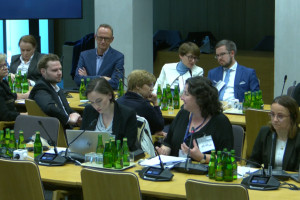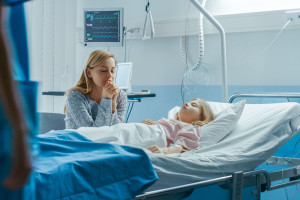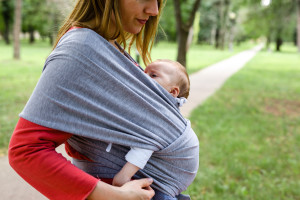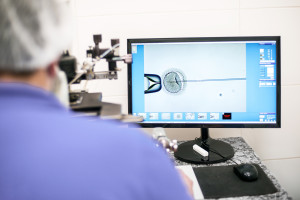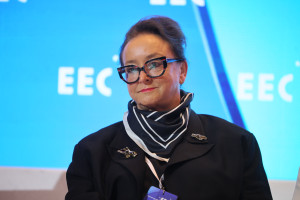The National Health Fund does not pay for every stay of a mother with a newborn. They send them home or count the losses

- - In many cases, parents' stay with their children is unfortunately still impossible or limited. Often due to the arbitrarily adopted work organization in the wards - said Justyna Oknińska-Janzen from the Office of the Ombudsman for Children in the Sejm
- Experts discussed the solutions used in this area in neonatal, neonatology and intensive care units at the meeting of the Parliamentary Team for Perinatal Care
- They drew attention to the need to change the financing conditions for a mother's stay in hospital with a newborn who requires long hospitalization.
- - We use the courtesy of gynecologists and have separate rooms for mothers who stay in the clinic for so-called hotel days. However, this generates losses - said Prof. Barbara Królak-Olejnik
Currently, although the regulations guarantee parents the possibility of providing care for hospitalized children, internal hospital regulations often limit this. Experts discussed the solutions used in this area in neonatology and intensive care units during the meeting of the Parliamentary Team for Perinatal Care.
Justyna Oknińska-Janzen from the Office of the Ombudsman for Children, who was present at the meeting, emphasized that the system should provide parents with the possibility of accompanying hospitalized children. The law regulates these issues, but hospital practice often leaves much to be desired.
- In many cases, parents' stay with their children is unfortunately still impossible or limited to a few hours a day. This is often due to the arbitrarily adopted work organization in the wards, and not individual decisions that take into account the situation of a given child - Justyna Oknińska-Janzen noted.
She explained that hospitals limit parents’ access to their children, citing Article 5 of the Act on Patients’ Rights and the Patients’ Rights Ombudsman, which gives hospitals such an option for epidemiological or organizational reasons.
- Unfortunately, these organizational deficiencies are often abused and indicated as a basis for parents not being able to stay in the ward or being able to stay in it only during certain hours - she said.
She also cited the example of the recent intervention of the RPP in the case of a woman whose hospital refused to allow her to stay in the ward with her prematurely born child. - We would like to see as few such interventions as possible - she emphasized.
Neonatology has no beds. Hospitals send parents home or generate lossesAt the University Clinical Hospital in Wrocław, mothers of premature babies can stay with their child at all times. - This constant presence is very important and we have managed to work out such a possibility. From the moment the child is born, the mother simply stays with the child until it is discharged, if she wants to and has someone to leave the older child with. The problem is that she is a patient of the gynaecology and obstetrics clinic, because in the neonatology departments we do not have room for mothers - said Prof. Barbara Królak-Olejnik, head of the Department and Clinic of Neonatology at the Medical University in Wrocław.
- We do not have beds for parents. We only have armchairs, which helps us a lot and allows us to do kangaroo care, but it does not give parents the possibility of permanent stay with their child. Therefore, we use the kindness of gynecologists and we have separate rooms for mothers, who stay in the clinic practically for so-called hotel days. However, this generates "losses" because these mothers are not paid by the National Health Fund, and they are patients of the clinical ward, which means they use a hospital bed and hospital meals, often for several months - she said.
She explained that the National Health Fund "does not pay for such a long stay with a sufficiently high number of points". Using homogeneous patient groups, the stay of an extremely premature baby is relatively highly valued, but this money goes to the account of neonatology departments.
- This is a problem especially in clinical departments, where mothers from distant regions often end up. A hotel stay would be too expensive for many, and parents stay in hospital without paying for anything at all. Unfortunately, the National Health Fund does not cover these stays either - she lamented.
The same problem was also pointed out by Prof. Beata Łoniewska, head of the Neonatal Pathology Clinic at the University Clinical Hospital No. 2 PUM in Szczecin. - If we are talking about a one-month or longer stay of a newborn, this is such a long period that we have nowhere to put the mothers. We have a problem with space. In the newly built part of the hospital, we managed to create one three-person room for mothers. However, it is mainly used by mothers who have to return to the hospital with newborns who have already been discharged, or premature babies who will be discharged home any day now, and parents "learning" how to care for them there. Other mothers are forced to come to the ward from home every day to spend the day with their little ones - she said.
She pointed out that she saw two key problems in this respect - the lack of hospital accommodation and the lack of guaranteed financing for stays for mothers of newborns.
"Not everyone can afford hospital meals"The housing situation in the Voivodeship Hospital Centre of the Jelenia Góra Valley is very good. - Our ward has been equipped with two hotel rooms (three beds in one), where mothers can stay for up to several months. We also have two "rooming-in" rooms. The problem, however, is financing. The National Health Fund only pays for the bed, without food, and some women from distant towns have nothing to eat. They will not go down to the hospital bar, because the costs are too high for them, and no one from their family will bring them food. However, for epidemiological reasons, we do not want women to go to the supermarkets. There have been situations where they returned to the ward with an infection. That is why once a week a mother tells us that she would like to stay longer, but she has to go home because she cannot afford to feed herself in the hospital - pointed out Monika Kostrzewa, head of neonatology at the hospital in Jelenia Góra.
Dr. hab. n med. Paweł Krajewski, head of the Neonatology and Neonatal Intensive Care Clinic at the Institute of Mother and Child in Warsaw , admitted that in his department, as in most such departments in Poland, parents cannot spend the night. Neither the local conditions nor the full occupancy of the local gynecology department allow for this. And the percentage of abnormal births, despite the general decline in fertility, is not decreasing.
- In 2024, out of 2,400 deliveries, we had 600 abnormal deliveries. We are unable to provide parents with accommodation. This is impossible due to the number of procedures performed and the workload of the ward. A premature baby weighing 600 grams has about 480 painful procedures performed during its stay in the ward - he explained.
He assured that the hospital gives parents the opportunity to visit whenever they want, because they are needed in the therapy. - This is a good way to improve the results in the wards and strengthen the bond between parents and children. However, we have to be aware of the realities, so that it is not the case that we build a beautiful glass house that will not function, because our expectations or obligations will diverge from reality - he warned.
There will be no fewer premature births. Training of primary care midwives is neededThe experts drew attention to another aspect, namely the parents' unwillingness to care for a premature baby. - Often, discharging a child from the ward is prevented by the awareness that we are not able to guarantee them proper care after leaving the hospital. Unfortunately, the patronage care for a premature baby is definitely different from the patronage care for a healthy newborn and the 4-6 visits that are planned for a community midwife in the case of a healthy newborn are insufficient - explained Dr. Anna Jaworska, head of the neonatal ward at the Provincial Hospital in Poznań.
She cited the solution used in Great Britain as a good example, where during the first weeks of the child's stay at home, the care of the premature baby is provided by a midwife from the hospital ward.
- I think that if we improved the care of newborns after they are discharged from hospital, it would also relieve neonatal wards to some extent - suggested the expert.
In response to the reported problem, the national consultant in the field of obstetrics and gynecology , Prof. Ewa Wender-Ożegowska, proposed additional training for community midwives in the care of premature babies. - The district midwife will always be present in the place where the mother who returns home with the child lives - she said.
She also reminded us that there are more patronage visits for premature babies, and their parents are entitled to extended maternity leave. She also drew attention to the important role of rehabilitation of premature babies and the increasing percentage of abnormal births.
- The problem of caring for a child born prematurely or with complications will grow, and unfortunately the National Health Fund practically does not provide for the mother's stay in the ward with the newborn in this situation - she admitted. - Some hospitals solve this on their own, but it is a really significant problem and I take my hat off to the Team for taking a closer look at it. We have to solve this somehow - she admitted.
She explained that there is currently no procedure for the hospitalization of a mother beyond a certain number of days after childbirth or caesarean section, and each additional day that mothers request is usually financed by the hospital.
Copyrighted material - reprint rules are specified in the regulations .
rynekzdrowia



